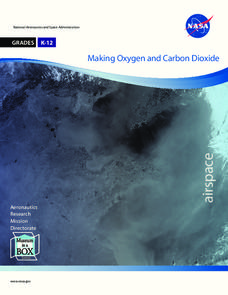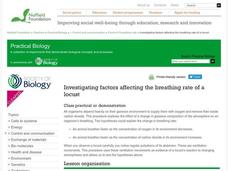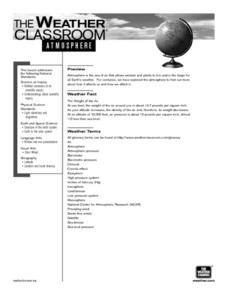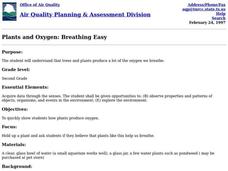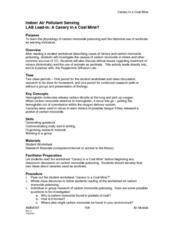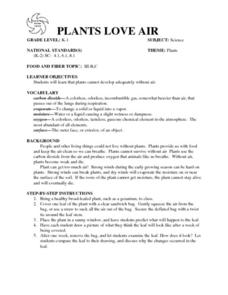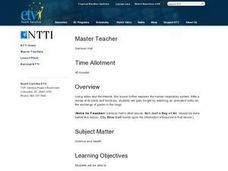NASA
Making Oxygen and Carbon Dioxide
Some like it hot! Scholars observe both exothermic and endothermic reactions as part of the carbon dioxide oxygen cycle. First, scientists demonstrate (or watch) a chemical reaction to create pure oxygen using fire for...
US Environmental Protection Agency
Carbon Through the Seasons
Meteorologists view an animated video by the Environmental Protection Agency to learn how the carbon cycle works, and then move into groups to analyze and graph actual data of the atmospheric carbon dioxide concentration from Hawaii's...
Curated OER
Moebius Strips
Students make Moebius strips and use them to demonstrate the interconnectedness of an environment. They explore the natural cycles (water, oxygen/carbon dioxide, carbon, nitrogen) within the environment. They describe how the cycles are...
American Chemical Society
Air, It's Really There
Love is in the air? Wrong — nitrogen, oxygen, and carbon dioxide are in the air. The final lesson in the series of five covers the impact of temperature on gases. Scholars view a demonstration of gas as a type of matter before performing...
Population Connection
The Carbon Crunch
Carbon is in the air; should we care? Teach the class why it is important to pay attention to carbon levels and how the world population and various countries across the globe affect the carbon levels in the atmosphere. High schoolers...
Rainforest Alliance
Investments in Forest Carbon
One hundred metric tons of CO2 can accumulate in one acre of forest over time—that's a lot of carbon! In the activity, groups of middle school learners determine what makes forests important. They then solidify the concept by using a...
Baylor College
About Air
Give your class a colorful and tasty representation of the components of the mixture that we call air. Pop a few batches of popcorn in four different colors, one to represent each gas: nitrogen, oxygen, argon, and carbon dioxide. The...
Nuffield Foundation
Investigating Factors Affecting the Breathing Rate of a Locust
Do animals breathe faster when given more oxygen or more carbon dioxide? Young scientists observe the respiration rates of locusts under a variety of gas concentrations to answer that very question. They collect data, analyze the...
Curated OER
Photosynthesis: Intake of Carbon Dioxide - Production of Oxygen
Students, after a long-term observation of photosynthesis with aquatic plants, assess the benefits of photosynthesis towards all living organisms. They explain in their own words the two cycles within photosynthesis. Guided discussion...
Curated OER
Air Quality Issues
Students identify the different layers of the atmosphere. They examine the different types of air pollutants. They also discover laws in effect that work to protect the environment.
Chicago Botanic Garden
Climate and Forest Ecosystem Services
Forests, through sequestration, capture excess carbon dioxide in our atmosphere and store it, aiding in climate change. The third installment in a four-part series on how climate impacts forests explores carbon sequestration....
Curated OER
The Weather Classroom - Atmosphere
Meteorology learners explore the weight of air, layers of the atmosphere, and air pressure action through a series of discussions, demonstrations, and hands-on group activities. Enough discussion prompts, background information, student...
Curated OER
Air and Water in the Environment
Students demonstrate an awareness of air as a substance that surrounds us and takes up space, and whose movement we feel as wind. They predict and describe how local weather conditions affect living things, including themselves.
Montana State University
Climb into Action!
Climate change affects even the largest and intimidating of landforms—even Mount Everest! A resource helps teach learners the connection between global climate change and its effects on Earth. Activities include videos, class discussion,...
Curated OER
Carbon Dioxide: The Heat is On
Students examine the greenhouse gases affecting the atmosphere. In groups, they participate in activities in which they examine the effects of heat on the atmosphere and phytoplankton. They research how the phytoplankton differ in warm...
NASA
Producers Make Their Own Food
During an inquiry-based lesson plan, scholars decide which variable to test and then design an experiment to determine the needs of producers. After two weeks, they complete a full analysis and research paper.
Curated OER
Indoor Air Pollutant Sensing LAB Lead-In: A Canary in a Coal Mine?
Students investigate the causes of carbon monoxide in mines and other common sources of CO. Pupils read the worksheet "Canary in a Coal Mine" before beginning this investigation. They discuss ethical issues regarding treatment of miners...
Curated OER
PLANTS LOVE AIR
Learners identify that plants cannot develop adequately without air and predict what happens to the leaf of a geranium brought to class. They draw a picture of what they think the leaf will look like after a week of being covered....
Curated OER
The Biological Carbon Cycle
Students learn about the biological carbon cycle. In this carbon cycle instructional activity, students access the web site and mouse over the diagrams to follow the carbon cycle. They read about what happens to humans and plants during...
Science Matters
Under Pressure
Sometimes a little pressure isn't a bad thing! A collaborative instructional activity uses models to demonstrate how air pressure inflates and deflates the lungs. Participants use everyday materials to create models of the chest cavity...
Curated OER
Is Air a Fluid?
Students discuss the physical properties of fluids and then demonstrate that air carbon dioxide and oxygen) is a fluid by creating currents.
Curated OER
CO2 Blow Out!
Fifth graders determine that carbon dioxide is a gas given off during respiration and that oxygent is the gas that is absorbed during respiration. They determine the air capacity of the lungs.
Curated OER
Benefits of Indoor Plants
Students diagram a plant. In this Science lesson, students explore the concept of photosynthesis focusing on the oxygen production. Students calculate the amount of plants needed to filter the air in their classroom.
